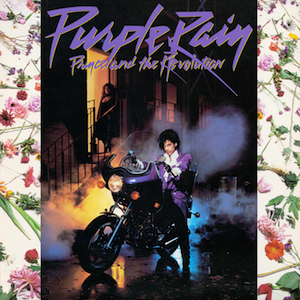
Purple Rain (1984)

1. Let's Go Crazy
2. Take Me With U
3. The Beautiful Ones
4. Computer Blue
5. Darling Nikki
6. When Doves Cry
7. I Would Die 4 U
8. Baby I'm a Star
9. Purple Rain
There’s a fair case to be made that Purple Rain isn’t Prince’s best album. But that argument becomes less convincing once you consider just how seismic this record actually was. It’s easily his most famous, the biggest seller, the most influential, and the one that permanently locked him into the pop pantheon. For a performer who already stood out in just about every possible way, this was the record that turned him into something more than a star—it made him a cultural landmark. Artists like this don’t show up often. Some generations get one. Some don’t. The ‘80s got Prince, and Purple Rain was the moment it all came together.
Call it a perfect storm. The funk is there, of course—Prince never left that behind—but it’s been fused with bright, buzzing synths, high-octane rock guitars, and hooks designed to grab just about everyone. And it worked. Didn’t matter if you were black or white, young or old, funk-head or rocker—somehow, this music reached you. Even if you’d never listened to him before, odds are this was the album that turned you into a fan.
Technically, this is a soundtrack to the movie of the same name. But let’s be honest: nobody talks about the movie unless they’re making fun of the acting or laughing at the hairstyles. The plot—loosely autobiographical, with Prince playing “The Kid”—was mostly just a frame to hold the songs together. And youth flocked to the film not because it was Oscar-worthy, but because of what was coming through the speakers. These days, if people revisit the movie, it’s usually for the retro fashion and nostalgia, not the story.
This album dropped during my senior year of high school, so I admit I’m biased. But ask anyone who came of age around 1984–85, and they’ll likely say the same thing: Purple Rain was the soundtrack to everything. If you were hanging out, driving around, heading to a party, or falling in love, Prince was somewhere in the background. These songs are woven into the fabric of the time.
Right from the start, the record hits you hard. Let’s Go Crazy and When Doves Cry are two of the hardest-rocking, most urgent songs in his entire catalog. Take the best parts of rock, funk, and pop, throw in some unfiltered passion, and wrap it all up in the voice of someone who doesn’t sound like anybody else—and you’ve got music that connects across the board. Elsewhere, tracks like Computer Blue, I Would Die 4 U, and Take Me With U lean heavily into synth-pop, full of all the blips and bloops that defined the era. Yes, they sound dated. No, it doesn’t matter. Great songs always punch through the surface noise.
Of course, no discussion of this album is complete without mentioning Darling Nikki. This is the track that launched a thousand pearl-clutching PTA meetings. It’s raunchy, no question, but Prince had written far filthier songs by this point. Still, given how many unsuspecting parents bought this record for their kids thinking it was harmless Top 40 fun, the reaction isn’t hard to understand. Hearing Prince croon about Nikki’s adventures in a hotel lobby probably wasn’t what Mom and Dad had in mind. But musically? Like everything else on here—it’s brilliant.
On the other end of the emotional spectrum, there’s The Beautiful Ones, a heartbreakingly fragile ballad that builds into something borderline operatic. But nothing—and I mean nothing—can touch the title track. The closing number, nearly nine minutes long, is more than a song. It’s a statement. It’s catharsis. It’s arguably Prince’s greatest single moment on record. And depending on who you ask, maybe the greatest song anyone’s ever recorded. Big claim? Sure. But when it’s over, it somehow doesn’t feel long enough.
By now, Prince was firmly locked in with his band, The Revolution, and the presence of collaborators like Wendy Melvoin and Lisa Coleman is unmistakable. (If you’ve always wondered whose voice you’re hearing on Take Me With U, it’s probably one of them.) And even though Prince had always been a one-man band in the studio, the contributions from others only made the songs stronger here. There’s a looseness, a shared energy, that hadn’t been quite so present before.
From this point forward, purple would be more than a color—it would be a brand. A symbol. And Prince would wear it well. This album is a masterpiece, no matter how you slice it. Even when the lyrics dive into darkness, pain, or outright lust, the music itself feels like celebration. If you were alive in the mid-‘80s, Purple Rain wasn’t just something you listened to. It was something you *lived* through. And if you weren’t? It’s still not too late to understand why the rest of us never stopped listening.
Go back to the main page
Go to the Next Review